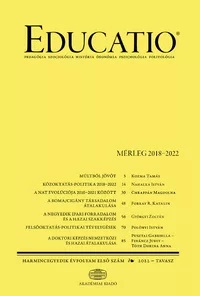Kiemelt OECD-programok magyarországi tapasztalatai
Hungarian Experience with OECD Flagship Programmes
Author(s): Anna Imre, László OstoricsSubject(s): School education
Published by: Akadémiai Kiadó
Keywords: public education; student achievement; skills
Summary/Abstract: The OECD does have an impact on the education of its member countries, which it achieves primarily through soft means. Among these tools, the collection and publication of educational indicators and data collection, analysis and dissemination through international measurements are prominent. The INES (Indicators for Education Systems) program is responsible for and is also a source of these activities. The inception of all three large-scale assessments currently operated by the OECD: PISA (the Program for International Student Assessment), TALIS (Taching and Learning International Survey) and PIAAC (Program for International Assessment of Adult Competencies) can be attributed to this. The paper shows the emergence of both TALIS and PISA as examples of two different ways of assessment development within the OECD. Hungary participated in these programs with different frequency and enthusiasm. Our participation in PISA cycles has been constant since 2000, on the other hand we have only participated in two of the three TALIS events, and PIAAC has so far been conducted entirely by the OECD only once - with Hungarian participation, of course. Thus, only PISA has had a real opportunity to have a lasting impact on the Hungarian education system. This effect can be seen in the fact that, in parallel with our participation in the assessment program and partly due to the ensuing knowledge transfer, Hungary has developed a national assessment system that promotes evidence-based decision-making from parents andschools through maintainers to the education policy level.
Journal: Educatio
- Issue Year: 30/2021
- Issue No: 4
- Page Range: 654-670
- Page Count: 17
- Language: Hungarian

